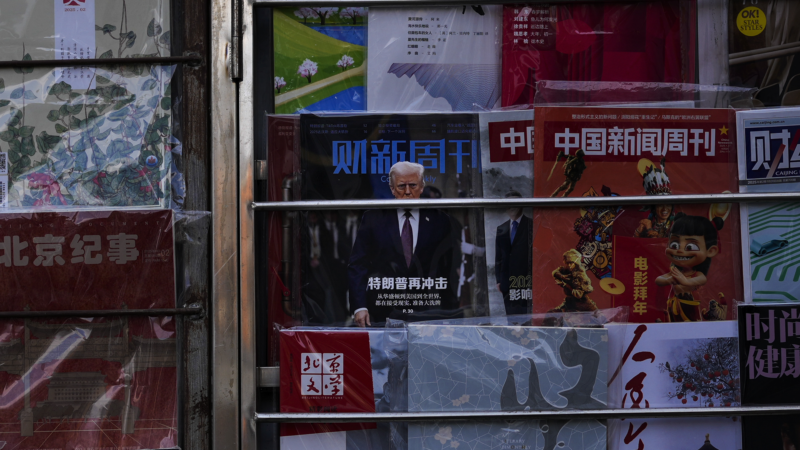Chinese counter-tariffs to kick in as Trump threatens more to come
BEIJING — Retaliatory Chinese tariffs on a range of U.S. products are due to take effect on Monday, as trade friction between the two rivals heated up with no end in sight.
The tariffs from China range from 10% to 15% and are applied to crude oil, liquefied natural gas, farm machinery and select other products from the United States.
They were announced last week in response to the Trump administration’s decision to hit China with a 10% across-the-board duty in a bid to pressure Beijing to do more to stop the flow of the deadly synthetic opioid fentanyl into America. China is a major source of the chemicals used by cartels in Mexico to make the drug.
Asked about the tariffs, Chinese Foreign Ministry spokesman Guo Jiakun told a daily news conference on Monday in Beijing there are no winners in a trade war or a tariff war.
“It harms the interests of both peoples,” he said. “What is needed now is not the unilateral imposition of tariffs but dialogue and consultations based on equality and mutual respect. We urge the U.S. side to stop its wrongful actions and refrain from politicizing and instrumentalizing economic and trade issues.”
Beijing’s response did not stop with retaliatory tariffs. Authorities last week announced an antitrust investigation into Google, added two other U.S. companies to an “unreliable entities” blacklist, and increased export controls on rare metals that are crucial to technology supply chains.
Harry Murphy Cruise, head of China economics at Moody’s Analytics, said the response was a warning shot.
“It is China saying: We don’t want to make the situation worse, and so our response is going to be quite restrained relative to what we could do. But in putting some of those export controls on critical minerals and rare earths, it is saying to the U.S.: We can make it really tricky for you if this gets worse,” he said.
During Trump’s first term, Beijing responded proportionally to tariffs, ensuring that the effective tariff rate on U.S. goods entering China – the average across all imports – matched that imposed on Chinese imports going into the United States.
Murphy Cruise said for now China is allowing the effective tariff rate on its American imports to be much lower, while sending a signal. The U.S. tariffs cover about $450 billion worth of Chinese goods, while the Chinese tariffs hit $15 billion to $20 billion in American goods, he said.
China dominates the rare earth industry, accounting for the bulk of global mining and refining.
When the Trump administration announced the 10% tariff on China, it also threatened 25% tariffs on goods from Canada and Mexico, but held off after last-minute negotiations. The White House said at the time it expected a call between Trump and Chinese leader Xi Jinping, but later Trump said he was in no hurry to talk to Xi.
“The biggest unknown is when will President Xi and President Trump meet and discuss, and where do those discussions go? It’s really unclear,” Murphy Cruise said. “The risk is that it goes down a similar route to last time where it’s tit-for-tat.”
The increased trade friction between the world’s two largest economies comes at a tough time for China, where the economy has been sluggish for more than two years as the authorities grapple with a real estate crisis, soaring debt, and deflation.
In the U.S., too, some analysts expect the risk of inflation to give the Trump administration pause when it comes to jacking up tariffs. Trump threatened to impose tariffs of 60% or more on Chinese goods during the presidential campaign.
But Trump said on Sunday more were coming. He said he would impose tariffs of 25% on all imports of steel and aluminum, and has threatened tariffs on Taiwan, Europe and others.
Aowen Cao contributed to this story.
Opinion: Remembering Renee Good
Renee Good won a national prize six years ago for her poem "On Learning to Dissect Fetal Pigs," which muses on science and faith. Good was shot to death by an ICE agent this week in Minneapolis.
2026 looks ominous for media, from Hollywood to journalism
Critic at large Eric Deggans says that in 2026, audiences have more power than they realize to determine the future of news and entertainment.
Influencer, White House welfare fraud claims are distorted, but the system has risks
Federal officials are targeting Democratic-led states over alleged safety-net fraud. Critics worry a drumbeat of unfounded accusations could undermine public trust.
New video shows fatal Minnesota ICE shooting from officer’s perspective
The video, published online by a Minnesota-based news site, Alpha News, and reposted by the Department of Homeland Security, shows the shooting from the perspective of the officer who fired the shots.
RFK Jr. cast doubt on a key vaccine. This country can’t wait to get it
The U.S. is cutting the Hepatitis B vaccine from its recommended list. But here's a place where the medical establishment — and a rapper — are eager to obtain it.
Six months later, the Texas Hill Country is still living with effects from flooding
More than 130 people died as floodwaters swept through the region on July 4. Now, recovery continues amid legal action and scrutiny of flood preparedness.







